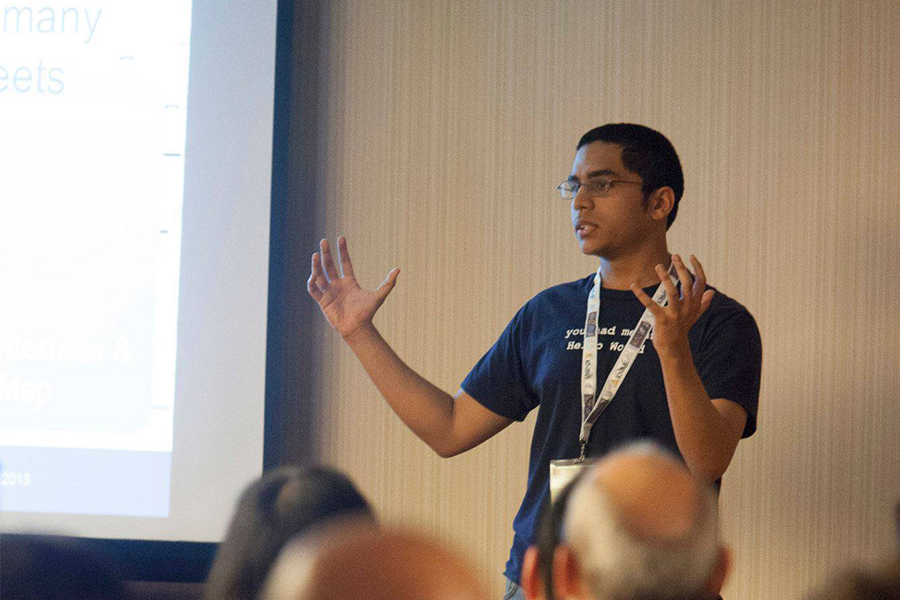
Using the Quantitative Social Sciences Scholars Program To Jumpstart a Data Science Career
By Julia Chabala
Graduating with a degree in decision science as well as minors in machine learning, mathematics and computer science, Manojit “Jit” Nandi (DC’14) is about to embark upon the next step in his professional career. He recently started a new position as a data scientist for New York-based startup Rocketrip, a company that aims to help other companies and their employees financially benefit on business trips.
During his tenure as a Carnegie Mellon University undergraduate, Nandi was also a student in the Dietrich College of Humanities and Social Sciences’ Quantitative Social Science Scholars Program (QSSS). QSSS, led by Mark Patterson, is designed to help academically-exceptional students gain advanced quantitative technical skills that can be applied towards careers as entrepreneurs, policymakers or, in Nandi’s case, a data scientist.
Nandi recently spoke about his experience as a QSSS alumnus, why he pursed data science as a career and his new position as Rocketrip.
Why did you choose to attend CMU?
While in high school, I searched for ways to combine my interest in artificial intelligence with my love of politics and public policy. When I began applying to different colleges, I discovered the QSSS Program. I believed that a program like QSSS would allow me to thoroughly explore my combined interests.
Were there any professors or advisers at CMU who helped you reach any certain feats? If so, how did they help?
Russell Golman, the former director of the QSSS program and my senior thesis advisor, was a constant source of guidance throughout my time at CMU. Through my discussions with him, I discovered many ways to bridge my interest in decision science with my aptitude in computer science and mathematics. I wanted to combine my interest in machine learning with social network analysis for my senior honors thesis, and once he agreed to be my thesis advisor, I was able to complete my thesis as part of the Dietrich College Honors Thesis.
How did your Carnegie Mellon education prepare you for your career?
My professors and advisors encouraged me to pursue coursework and projects that reflected my interests in machine learning and the social sciences. With my decision science major, I took classes on topics ranging from social network analysis to psychometrics to causal inference—all of which I have used at some point in my career. Because of my hybrid background in computer science, statistics and the social sciences, I was one of three undergraduate students accepted in the 2013 Data Science For Good Fellowship, which I consider to be the start of my data science career.
Was the QSSS program helpful in preparing you for your career? If so, how?
I feel the QSSS was extremely helpful in preparing me for my career. While in the program, I collaborated with individuals of both technical and non-technical backgrounds on many projects. Now as a data scientist, I work with both software engineers to ship production-level algorithms and sales specialists to properly market and advertise products. Since I also regularly speak at data science and machine learning conferences, learning how to effectively explain my work to diverse audiences was an invaluable skill.
What previous jobs have you had since graduation? What were your responsibilities?
I’ve previously worked as a data scientist for Verizon Wireless, STEALTHbits Technologies and AppEagle. At Verizon Wireless, I created business intelligence reports for sales and marketing teams to identify customers who were likely to churn. While at STEALTHbits, I implemented machine learning algorithms for anomalous behavior detection. I leveraged my decision science background at this role for creating novel methods for conveying the potential risk of any particular user based on their activity. Most recently at AppEagle, I designed strategies for algorithmically repricing merchandise on Amazon and other online marketplaces.
What are your job responsibilities as a data scientist at Rocketrip?
At Rocketrip, I’m in charge of engineering data pipelines and implementing state-of-the-art machine learning algorithms. I work with UX designers to formulate experiments to test and measure the results of product changes. I also create presentations about my analyses for sales teams and business stakeholders.
What’s so intriguing working for start-ups?
I’ve once heard that working at a startup is similar to metaphorically jumping off a cliff and creating a pair of wings on the way down. Because of this, I feel startup environments are faster paced compared to larger organizations. I have more ownership of my work and am encouraged to find innovative, yet practical solutions to our challenges. At the same time, additional challenges can unexpectedly arise because you are usually in a race against the clock to become a profitable company before your venture capital funding runs out.